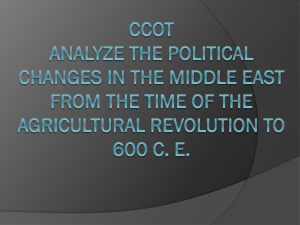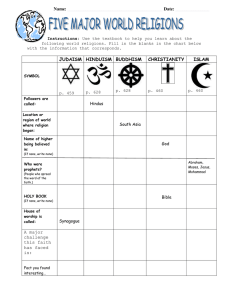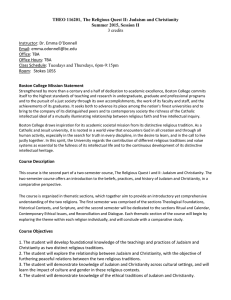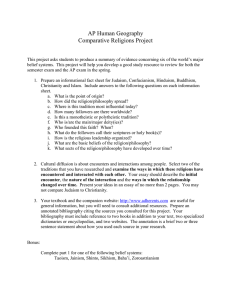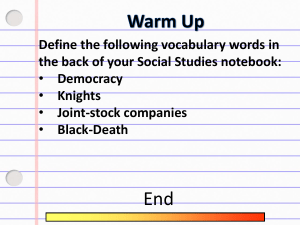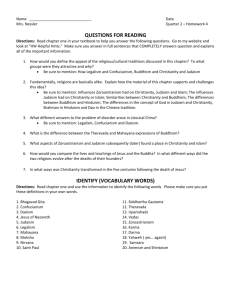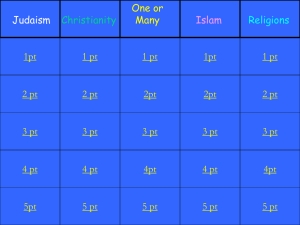,
advertisement
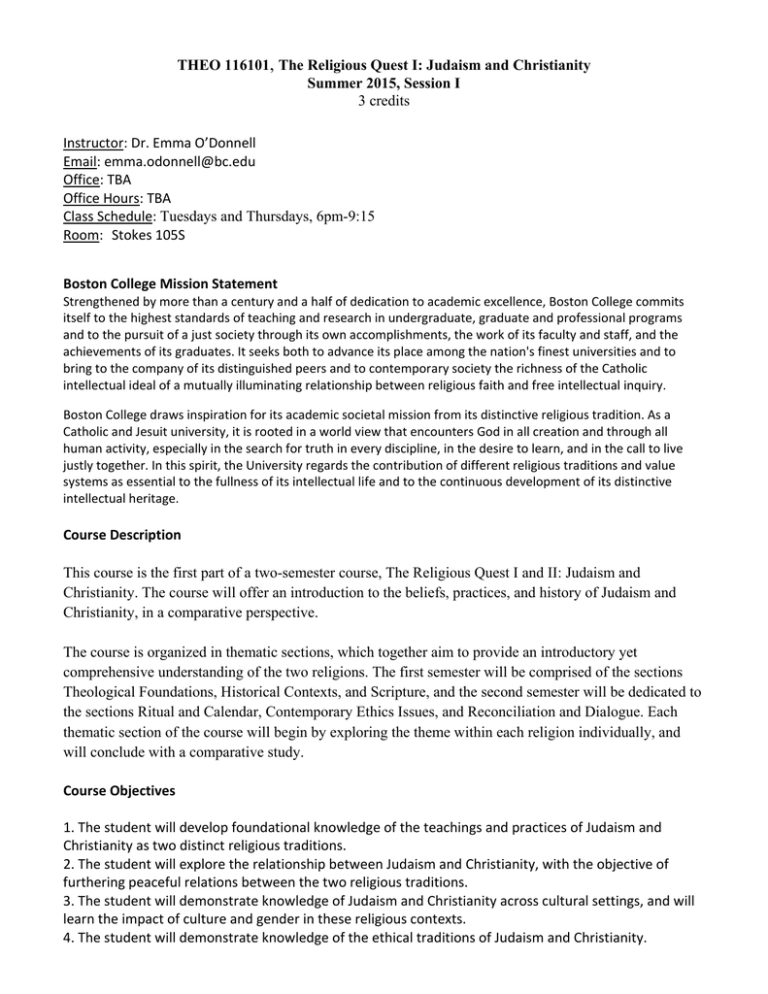
THEO 116101, The Religious Quest I: Judaism and Christianity Summer 2015, Session I 3 credits Instructor: Dr. Emma O’Donnell Email: emma.odonnell@bc.edu Office: TBA Office Hours: TBA Class Schedule: Tuesdays and Thursdays, 6pm-9:15 Room: Stokes 105S Boston College Mission Statement Strengthened by more than a century and a half of dedication to academic excellence, Boston College commits itself to the highest standards of teaching and research in undergraduate, graduate and professional programs and to the pursuit of a just society through its own accomplishments, the work of its faculty and staff, and the achievements of its graduates. It seeks both to advance its place among the nation's finest universities and to bring to the company of its distinguished peers and to contemporary society the richness of the Catholic intellectual ideal of a mutually illuminating relationship between religious faith and free intellectual inquiry. Boston College draws inspiration for its academic societal mission from its distinctive religious tradition. As a Catholic and Jesuit university, it is rooted in a world view that encounters God in all creation and through all human activity, especially in the search for truth in every discipline, in the desire to learn, and in the call to live justly together. In this spirit, the University regards the contribution of different religious traditions and value systems as essential to the fullness of its intellectual life and to the continuous development of its distinctive intellectual heritage. Course Description This course is the first part of a two-semester course, The Religious Quest I and II: Judaism and Christianity. The course will offer an introduction to the beliefs, practices, and history of Judaism and Christianity, in a comparative perspective. The course is organized in thematic sections, which together aim to provide an introductory yet comprehensive understanding of the two religions. The first semester will be comprised of the sections Theological Foundations, Historical Contexts, and Scripture, and the second semester will be dedicated to the sections Ritual and Calendar, Contemporary Ethics Issues, and Reconciliation and Dialogue. Each thematic section of the course will begin by exploring the theme within each religion individually, and will conclude with a comparative study. Course Objectives 1. The student will develop foundational knowledge of the teachings and practices of Judaism and Christianity as two distinct religious traditions. 2. The student will explore the relationship between Judaism and Christianity, with the objective of furthering peaceful relations between the two religious traditions. 3. The student will demonstrate knowledge of Judaism and Christianity across cultural settings, and will learn the impact of culture and gender in these religious contexts. 4. The student will demonstrate knowledge of the ethical traditions of Judaism and Christianity. Grading The grade will be determined by the following components: 20% Midterm Exam 35% Final Exam 30% Research Paper 15% Class Participation WCAS Grading System The undergraduate grading system consists of twelve categories: A (4.00), A‐ (3.67), excellent; B+ (3.33), B (3.00), B‐ (2.67), good; C+ (2.33), C (2.00), C‐ (l.67), satisfactory; D+ (l.33), D (l.00), D‐ (.67), passing but unsatisfactory; F (.00), failure; I (.00), incomplete; F (.00), course dropped without notifying office; W (.00), official withdrawal from course. The graduate grading system is A (4.00), A‐ (3.67), Excellent; B+ (3.33), B (3.00), good; B‐ (2.67), C (2.00), passing but not for degree credit; F (.00), failure. Grade Reports. All students are required to log into the web through Agora to access their semester grades. Students must utilize their BC username and password to log on. If your username or password is not known the HELP Desk located in the Campus Technology Resource Center (CTRC) in O’Neill Library will issue a new one. The CTRC requires a valid picture ID (a BC ID, driver’s license or passport) to obtain your password. Text(s)/Readings (Required) o Dosick, Wayne. Living Judaism: The Complete Guide to Jewish Belief, Tradition, and Practice. New York: HarperCollins, 2009. o McGrath, Alister E. Christianity: An Introduction. 3nd Edition. Blackwell Publishing, 2015.* *Note: McGrath has published a number of books with similar titles, and be careful to purchase the correct book. Be certain that you purchase Christianity: An Introduction, and do not mistakenly purchase either An Introduction to Christianity or Christian Theology: An Introduction. o The Bible: Any edition of the Bible in the New Revised Standard Version (NRSV). Online use of the Bible is acceptable, and may be accessed at http://bible.oremus.org/ . Important Policies http://www.bc.edu/content/bc/schools/advstudies/guide/academicinteg.html Written Work Graduate and undergraduate students are expected to prepare professional, polished written work. Written materials must be typed in the format required by your instructor. Strive for a thorough, yet concise style. Cite literature appropriately, using APA, MLA, CLA format per instructors decision. Develop your thoughts fully, clearly, logically and specifically. Proofread all materials to ensure the use of proper grammar, punctuation, and spelling. You are encouraged to make use of campus resources for refining writing skills as needed [http://www.bc.edu/libraries/help/tutoring.html]. Scholarship and Academic Integrity It is expected that students will produce original work and cite references appropriately. Failure to reference properly is plagiarism. Scholastic dishonesty includes, but is not necessarily limited to, plagiarism, fabrication, facilitating academic dishonesty, cheating on examinations or assignments, and submitting the same paper or substantially similar papers to meet the requirements of more than one course without seeking permission of all instructors concerned. Scholastic misconduct may also involve, but is not necessarily limited to, acts that violate the rights of other students, such as depriving another student of course materials or interfering with another student’s work. Request for Accommodations If you have a disability and will be requesting accommodations for this course, please register with either Dr. Kathy Duggan (dugganka@bc.edu), Associate Director, Connors Family Learning Center (learning disabilities or AHD) or Dean Paulette Durrett, (paulette.durrett@bc.edu), Assistant Dean for students with disabilities, (all other disabilities). Advance notice and appropriate documentation are required for accommodations. For further information, you can locate the disability resources on the web at http://www.bc.edu/content/bc/libraries/help/tutoring/specialservices.html. Attendance Class attendance is an important component of learning. Students are expected to attend all classes and to arrive by the beginning of and remain for the entire class period. When an occasion occurs that prevents a student from attending class, it is the student’s obligation to inform the instructor of the conflict before the class meets. The student is still expected to meet all assignment deadlines. If a student knows that he or she will be absent on a particular day, the student is responsible for seeing the instructor beforehand to obtain the assignments for that day. If a student misses a class, he or she is responsible for making up the work by obtaining a classmate's notes and handouts and turning in any assignments due. Furthermore, many instructors give points for participation in class. If you miss class, you cannot make up participation points associated with that class. Types of absences that are not typically excused include weddings, showers, vacations, birthday parties, graduations, etc. Additional assignments, penalties and correctives are at the discretion of the instructor. If circumstances necessitate excessive absence from class, the student should consider withdrawing from the class. In all cases, students are expected to accept the decision of the instructor regarding attendance policies specific to the class. Consistent with our commitment of creating an academic community that is respectful of and welcoming to persons of differing backgrounds, we believe that every reasonable effort should be made to allow members of the university community to observe their religious holidays without jeopardizing the fulfillment of their academic obligations. It is the responsibility of students to review course syllabi as soon as they are distributed and to consult the faculty member promptly regarding any possible conflicts with observed religious holidays. If asked, the student should provide accurate information about the obligations entailed in the observance of that particular holiday. However, it is the responsibility of the student to complete any and all class requirements for days that are missed due to conflicts due to religious holidays. There may be circumstances that necessitate a departure from this policy. Feel free to contact the WCAS at 617‐552‐3900 for consultation. Deadlines Assignments are due at the beginning of the class period on the specified dates. Late assignments will be graded accordingly. Course Assignments It is expected that 14 hours per week of your study time out will be spent on class readings and assignments. These are listed below. Please note that some weeks will require more time and some weeks less time but the average is approximately 8 hours per week over the semester. The topics and dates are listed below. Exact reading assignments for each class TBA. Section I: Theological Fundamentals of Judaism and Christianity Tues., 5/12 Introduction: Theological Fundamentals of Judaism and Christianity Thurs., 5/14 Theological Fundamentals of Judaism Tues., 5/19 Theological Fundamentals of Christianity Thurs., 5/21 Jewish and Christian Theological Fundamentals: A Comparative Study Tues., 5/26 MIDTERM EXAM and Introduction to Jewish History Section II: Historical Contexts Thurs., 5/28 Jewish History: Second Temple to the Enlightenment DUE: Proposal and bibliography for research paper. Tues., 6/2 Christian History: First Century to the Enlightenment Thurs., 6/4 Judaism and Christianity in the 21st Century Section III: Scripture Tues., 6/9 Introduction to Scripture: The Hebrew Bible, The New Testament, Rabbinic Literature, and Introduction to Biblical Criticism Thurs., 6/11 Narratives of the Hebrew Bible DUE: RESEARCH PAPER Tues., 6/16 New Testament Thurs., June 18 FINAL EXAM
